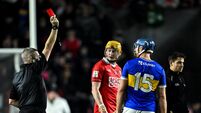From Santa to Scrooge...
THE ghosts of budgets past, present and yet to come have descended on Brian Cowen.
Having played Santa Cowen for two consecutive years, yesterday he assumed the role of Scrooge Cowen. Hence the routine whereby ecstatic backbenchers clap loudly each time Santa Cowen unveils another present from his sack of budget surprises was not evident in the Dáil.













